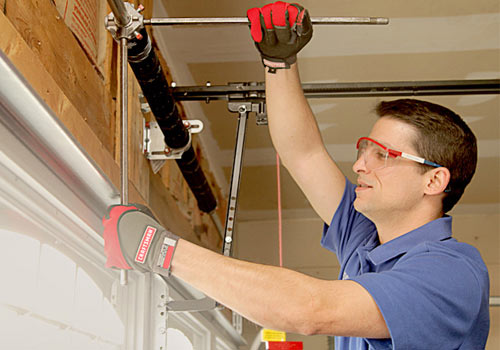Typical Garage Door Troubles and Exactly How to Take care of Them
Garage doors are vital for both security and benefit, yet they commonly offer a range of common issues that can frustrate house owners. While some problems might show up simple to deal with, others might require a more nuanced understanding of garage door mechanics.
Noisy Garage Door Procedure
A noisy garage door operation can be a significant resource of aggravation for homeowners, typically showing underlying mechanical problems. Such disruptions may stem from various reasons, including damaged rollers, loosened hardware, or inadequate lubrication. Identifying the resource of the sound is vital for reliable resolution.
One usual root cause of excessive noise is the visibility of corroded or worn-out rollers. Over time, these parts can deteriorate, bring about grinding or squeaking audios as the door moves. Routine evaluation and replacement of these rollers can significantly minimize sound degrees. Additionally, loose screws or screws in the door system can create rattling noises during procedure. Tightening up these fasteners guarantees a more steady and quieter motion.
One more adding factor is inadequate lubrication of the door's relocating components. Applying a top quality lube to the tracks, springtimes, and rollers can substantially diminish rubbing and noise. Property owners ought to do this maintenance occasionally to maintain optimal efficiency.
Finally, the garage door opener may also generate sound as a result of its age or mechanical problems. If the sound continues regardless of attending to various other aspects, getting in touch with an expert for a detailed examination and prospective repair work might be required.
Door Won't Open or Shut
Experiencing a garage door that won't open up or shut can be incredibly frustrating and commonly indicates a malfunction within the system. Numerous variables can add to this problem, and recognizing the source is crucial for reliable resolution.

Next, evaluate the safety sensing units located at the base of the door. These sensors can end up being misaligned or blocked by particles, preventing the door from operating properly. Tidy the sensing units with a soft fabric and guarantee they are lined up.
In addition, the garage door's inner parts ought to be reviewed. Issues such as a broken spring, worn-out rollers, or a damaged opener can hamper movement. If any parts show up to be harmed, it might be advisable to consult an expert for repair work.
Misaligned Tracks
To recognize misalignment, aesthetically evaluate the tracks for gaps or unequal spacing. If you discover any kind of disparities, it is vital to address the problem quickly - garage door service. Begin by loosening up the screws that protect the track to the wall surface, enabling changes. Meticulously touch the track back right into its proper position using a rubber mallet or a comparable tool, guaranteeing it is straight and level.
Regular upkeep, including cleansing the tracks and ensuring rollers are in excellent problem, can prevent future imbalances. By dealing with misaligned tracks quickly, you can bring back the functionality of your garage door and enhance its longevity.
Broken Springs
Amongst the various elements of a garage door system, broken springs are one of one of the most usual issues that can considerably hamper its functionality. Garage door springs are critical for balancing the weight of the door, permitting for smooth opening and closing. When a springtime breaks, it can bring about a door that is challenging to operate or, in many cases, entirely inoperable.
There are 2 primary kinds of springtimes: torsion springtimes, which are mounted above the door, and expansion springtimes, located on either side. Signs of a broken spring consist of a door that will not open up, a visible gap in the spring, or a loud noise throughout operation. Attempting to operate a garage door with a damaged spring can cause more damage to the door or the opener.
Repairing damaged springs is not a do it yourself project; it calls for specialized devices and experience due to the high stress included. It is a good idea to speak with a professional technician who can safely replace the springtimes and make certain the door is properly balanced. Routine maintenance and evaluations can help avoid spring failings and expand the lifespan of the garage door system.
Remote Issues

If the remote still falls short to run, evaluate the garage door opener to ensure that its sensing units are clean and unobstructed. Dust, particles, or imbalance might prevent the signal transmission between the remote and the opener.
Disturbance from various other digital tools can also impede remote functionality. Make sure that nearby devices, such as wireless routers or cordless phones, are not triggering disturbances. garage door service. If interference is presumed, try relocating these tools additionally away from the garage door opener
In many cases, the remote might require to be reprogrammed. Get in touch with the manufacturer's standards to reset the remote and synchronize it with the garage door opener. If all else fails and the remote continues to malfunction, take into consideration speaking with a professional technician for a comprehensive assessment and possible replacement of the remote or opener.
Conclusion
Comments on “High-Quality Garage Door Repair to Bring Back Smooth Function”